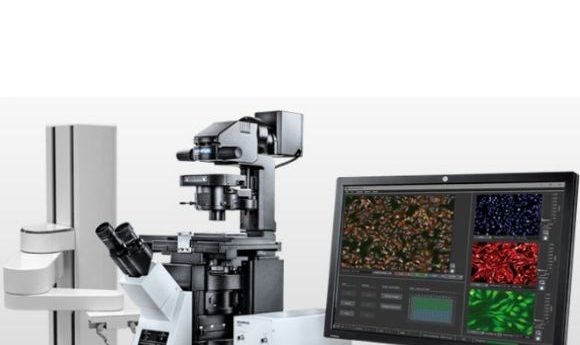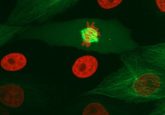New AI tech launched to drive drug discovery

Olympus has launched a new artificially intelligent, modular cell imaging and analysis solution in the US, in a bid to drive forward next-generation biological research.
The new scanR high-content screening (HCS) station combines self-learning microscopy – reducing photobleaching and improving speed, accuracy and measurement sensitivity – with high-throughput deep-learning analysis technology based on a dedicated convolutional neural network architecture.
“The screening application is more dedicated to robust and high-speed image acquisition, and the object detection and the classification,” Shohei Imamura (Strategic Project Manager, Olympus Corporation of the Americas; MA, USA) told BioTechniques at the recent ASCB meeting in Washington, DC. “So, in the end, the customer can do their cell-based assay application more easily.” The technology also allows for longer observations and/or faster data acquisition, without an effect on cell viability. All this combined has the potential to improve reproducibility of results.
- X Line vision
- Artificial intelligence set to revolutionize cell imaging methods
- Ge Wang and Margarida Barroso on the HOTGEM imaging technology for breast cancer
“An important step in analyzing data is analysis of the image for the content, finding interesting objects like cells, the nuclei and other cellular or sub-cellular segments,” continued Mike Wӧrdemann (Product Manager, Olympus Soft Imaging Solutions, Germany). “The classical way is to look for certain features. However, there are some tasks that cannot be solved with classical means; analysis of brightfield or low-fluorescence images, for example, is very challenging. Deep learning can do all these tasks quite easily as during the training phase it learns how to find interesting things even in very noisy or difficult-to-analyze data.”
The platform can accommodate both fixed and live cells, and automatically image multiwell plates, slides and custom-built arrays. It also performs analysis in parallel with acquisition in order to minimize time.
Find out more about the scan R technology here: https://www.olympus-lifescience.com/en/microscopes/inverted/scanr/





